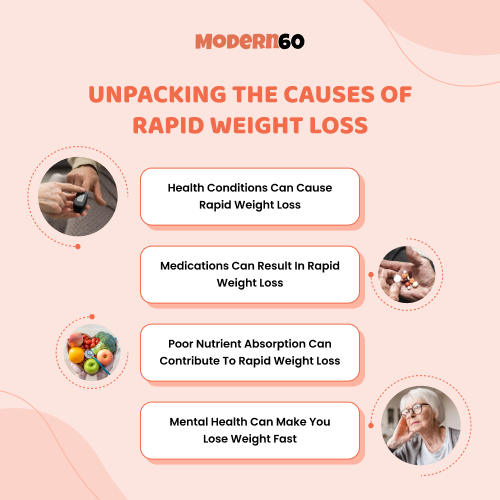This Seinfeld Star is Pro-aging and How!
Julia Louis-Dreyfus, famous for her roles in TV shows like Seinfeld and Veep, has been in the entertainment industry for several years. The star is 62 and has frequently spoken about the challenges o...

As you get closer to your senior years, your body will undergo many changes. It’s a normal and natural part of aging. It’s not just about the wrinkles but also changes inside your body.
Weight loss in old age is normal, but you may feel concerned when it happens too quickly. You may even be more worried if you have a good appetite but are still experiencing weight loss.
There are different reasons why this can happen. In this article, we will discuss why weight loss happens in old age and what you should do about it.
Aging is one of those natural processes that we can’t stop or reverse. Instead of fighting against it, it’s better to understand what changes to expect. You’ll be more informed, know what to expect, and can take the right steps to manage things as you get older.
Here are some changes everyone experiences as they age:
1. Loss of Bone Density. When talking about aging, one of the main focus points is usually placed on your bones. That’s because bones lose some of their density over time and become smaller. This leads to bones weakening over time, increasing your risk of fractures and injuries.

2. Muscle Atrophy. You’re also going to notice some muscle atrophy. As muscle tissue starts to decline, physical weakness could set in. You also face a higher risk for certain diseases in your senior year.

3. Change in Body Weight and Composition. Changes to body composition over time aren’t the same for everyone. However, it’s actually quite normal to lose some weight. Knowing when it’s a concern, however, is important.

4. Rapid Weight Loss. This is the most obvious warning sign. You may have a healthy appetite and eat regularly, yet you’re still unable to maintain your weight. Every time you climb onto the bathroom scale, it shows a lower number. This type of rapid weight loss might become noticeable in a short time.
These can impact your immune system, making you more vulnerable to infections. Over time, too much weight loss can affect your physical functionality. Things that used to be easy can become challenging, for example.
Over time, an older adult may also have difficulties with things like eating and getting dressed. This type of weight loss can actually extend to the mind, causing depression, isolation, and even triggering anxiety disorders.
A study in the Canadian Medical Association Journal found that around 27% of people 65 years and older experience weight loss involuntarily.

If you notice rapid weight loss, it’s important to understand why it’s happening. To give you a better idea of what’s going on, we should take a closer look at some of the most common reasons why older people experience such rapid weight loss.
As you get older, you have a greater risk of developing certain diseases. These illnesses may be the reason for your drastic weight reduction.
A group of researchers analyzed 91 elderly patients who had experienced unexpected weight loss. In 35% of these people, researchers could not identify a physical cause. However, in the rest, physical causes were linked to underlying health conditions.
Another study recommends screening older people for cancer when they have unexplained weight loss. The researchers specifically focus on cases with no symptoms or clear signs of a physical cause linked to the situation.
It’s not just about cancer, though. Other medical conditions can also contribute to this rapid weight loss. Some examples include heart disease, hyperthyroidism, and diabetes. If you have diabetes and it’s uncontrolled, then there’s a bigger risk that it could be the reason behind your weight loss.
It’s important to note that some gastrointestinal problems can change your appetite and how well your body absorbs nutrients from food. These issues can also result in rapid weight loss.
Another critical factor to look at when we talk about weight loss in old age is medication. It’s not uncommon for older people to take multiple pills every day. When this happens, some medication reactions can affect your weight management.
For example, consider a situation where you take medication that alters your taste. This could reduce how much food you eat. Some drugs could also have a more direct impact on your appetite.
As we’ve noted, when you have gastrointestinal problems, this could actually cause problems with how well your body can absorb nutrients. When you eat food, your body needs to get nutrients from it – and without the right nutrients, your cells can’t really function as well as they should.
Poor nutrient absorption means your body is not getting enough nutrition from the food you eat or supplements that you take. If this happens, then it’s also something that can contribute to weight loss. Usually, this won’t cause rapid weight loss, but more gradually. However, there are cases where a more serious underlying factor causes problems with poor nutrient absorption. In these cases, you may notice more rapid weight loss.
People often don’t consider mental health when asking what causes rapid weight loss in the elderly. However, emotional problems can also be the culprit. For example, if you have depression, it could reduce your will to take care of yourself.
Some mental conditions can cause changes to eating habits and appetite and even physically affect the body.
Living with specific conditions and losing weight can make life incredibly difficult.
In this section, we turn our attention to dementia.
Worldwide, over 55 million people are living with dementia.4 The rate of people being diagnosed with dementia is also climbing quickly, with 10 million new cases annually. Alzheimer’s disease is the most prevalent type of dementia. When looking at the prevalence of dementia specifically, up to 70% of cases are related to Alzheimer’s disease.
The diseases that cause dementia affect your brain. As the damage progresses, thinking and remembering events become difficult. Many people with dementia eventually no longer do the daily activities and chores that they used to do.
Now, how does this link up with weight loss in aging? Well, when you don’t have dementia, you can go about your daily routine, including exercise and eating habits. As dementia sets in, you may no longer be able to look after yourself properly. Forgetting to eat regular meals, for example, can result in malnutrition.
Another thing to keep in mind when we talk about weight loss in older adults with dementia is cachexia. This is a condition where a person loses both muscle and fat rapidly. It happens due to changes in metabolism, and you’ll lose weight even if you’re eating enough food. It’s not exclusive to dementia but is relatively common in the later stages of these conditions.
Now that we’ve looked at some reasons for weight loss in the elderly let’s focus on strategies that can help manage weight.
You first need to discover the root cause. If you can address the problem causing the weight loss, then it’s often possible to stop it.
However, if you can’t stop weight loss, you can manage it using some strategies.
The following strategies can help you manage weight loss:
Your healthcare provider can run some tests and ask about specific symptoms. This will help them better understand what is going on behind the weight loss. If they can point out a specific cause, they can start working on a treatment program.
(A) Let’s start with a nutritional strategy. Every person should have a personalized approach when it comes to nutrition. You’ll have to consider your daily eating habits. Look at how much food you eat while also focusing on what you put on your plate. One of the main ideas here is to get you into a calorie surplus. That means you’ll eat more calories than you burn daily. It’s an effective strategy that can be very helpful if you’re struggling with weight loss.
It’s not just about calories, though. You also have to make sure you get all the nutrients your body needs. When implementing this nutritional strategy for a loved one with dementia, you may need to help them remember to eat the right foods. You could also consider food prepping beforehand, which makes things more manageable.
(B) Next, plan an exercise routine. Exercise is something many seniors overlook. Aching joints, for example, can become an excuse not to exercise. Mobility tends to decline with age, but older adults must remain active.
However, there’s no need to go overboard with exercise. As you get older, it’s possible to slow down on the intensity of your workouts. Doctors generally recommend that you get about 150 minutes of exercise at a moderate intensity every week. You can have rest days and active days, for example. Apart from your standard cardio workouts, strength training can also be great for managing weight loss.
Strength training helps build and maintain muscle mass. Now, the thing is, as you get older, your muscles tend to deteriorate and become weaker. If you do strength training, though, you can prevent this from happening.
You may worry when rapid weight loss happens, especially when you have a good appetite.
One thing that you can do is implement proper prevention methods early on. Being proactive helps you manage your weight more effectively as you enter your golden years.
You can be proactive by doing the following two things:


If you ask, “Is it normal for the elderly to lose weight?” the answer is yes. However, rapid weight loss is a different story.
The first step to solving a rapid weight loss issue is to find out why you’re losing weight and address the root cause.

Doctor, author and fitness enthusiast, Ahmed Zayed, MD, is a surgery resident with a passion for helping people live a happy healthy life. Owner of Zayedmd and an author of numerous health-related books and contributor to several medicine, health and wellbeing websites, Dr. Zayed has spent his time between treating patients in the hospital and spreading awareness among the public. Having spent years helping patients, Dr. Zayed understands how important it is to have the correct information needed to maintain a healthy lifestyle. I wrote for many top-rated websites like Washington Post, Chicago Tribune, ConsumerHealthDigest, and many others. My ebook about coronavirus was on Amazon's bestseller list


Unlock expert insights and tips with our exclusive ebook. Enter your email to get your free copy.
Please check your email for a welcome message from Modern60. If it's not in your inbox, kindly check your spam or junk folder
Great information shared.. really enjoyed reading this post thank you author for sharing this post .. appreciated